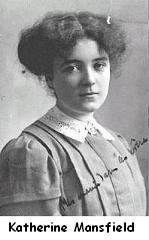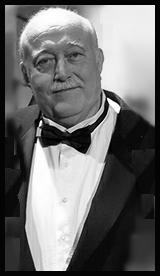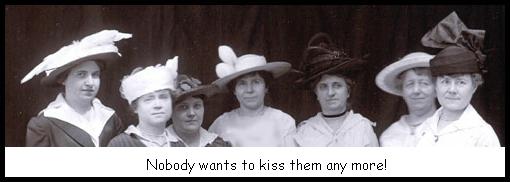Be sure to the read the story before you read this essay.
The Sad Dance of Life: A Reading of Katherine Mansfield's "Her First Ball"
 Writers (and football coaches) use many different metaphors for life -- life as a journey, life as a road, life as a battle, and even life as a football game.
Writers (and football coaches) use many different metaphors for life -- life as a journey, life as a road, life as a battle, and even life as a football game.  In Mansfield's "Her First Ball" we see yet another metaphor for life -- life as a dance. In other words, the careful reader is able to see that Leila's encounter with the strange old man at the ball, the older women grimly and unhappily chaperoning the ball, and the slippery dance floor can all be interpreted as figures of speech or symbols that tell us something important about the sad and somber way that Katherine Mansfield viewed life.
In Mansfield's "Her First Ball" we see yet another metaphor for life -- life as a dance. In other words, the careful reader is able to see that Leila's encounter with the strange old man at the ball, the older women grimly and unhappily chaperoning the ball, and the slippery dance floor can all be interpreted as figures of speech or symbols that tell us something important about the sad and somber way that Katherine Mansfield viewed life.
 Why was she sad and somber? When Mansfield wrote "Her First Ball" in 1922, her own death by tuberculosis was only a year away. She was an intelligent and beautiful woman, had until recently been an incredibly desirable woman with a "past," was still only 34 years old, had enjoyed much praise as an up-and-coming literary artist,
had been living the exciting life of the Roaring Twenties with important literary figures like James Joyce and Middleton Murray, but now knew she was dying of what was rather a horrible disease in the days before TB vaccinations were available, and knew exactly how painful her death would be. Death was about to rob her of a wonderful and exciting life, as exciting as the ball Leila was about to attend:
Why was she sad and somber? When Mansfield wrote "Her First Ball" in 1922, her own death by tuberculosis was only a year away. She was an intelligent and beautiful woman, had until recently been an incredibly desirable woman with a "past," was still only 34 years old, had enjoyed much praise as an up-and-coming literary artist,
had been living the exciting life of the Roaring Twenties with important literary figures like James Joyce and Middleton Murray, but now knew she was dying of what was rather a horrible disease in the days before TB vaccinations were available, and knew exactly how painful her death would be. Death was about to rob her of a wonderful and exciting life, as exciting as the ball Leila was about to attend:
She tried not
to smile too much; she tried not to care. But every single thing was so
new and exciting.
It would be cruel and insensitive to describe all the details of the death she faced, but just a few details will make the point -- in the last year of her life she would cough up blood almost non-stop, she would shrivel down to looking like a skeleton. . .get the point?

 So, in her story about Leila's first fancy dress ball where a strange old man reminds her that her youth and beauty and happiness will all very soon be gone, poor Katherine Mansfield presents the metaphor of her life as a dance toward Death:
So, in her story about Leila's first fancy dress ball where a strange old man reminds her that her youth and beauty and happiness will all very soon be gone, poor Katherine Mansfield presents the metaphor of her life as a dance toward Death:
Then quite an old man [appeared to ask her for a dance] -- fat, with a big bald patch on his head -- took her program and murmured "Let me see, let me see!
He has a shabby and raggedy look that suggests he has been dancing among the young people at these balls for a very long time:
. . .when Leila compared him with her other partners he looked shabby. His waistcoat was creased, there was a button off his glove, his coat looked as if it was dusty with French chalk.
And, as they move around the dance floor, the old man mentions that he has been dancing at these balls since twelve years before Leila was born and then he goes on to tell her truths about what life has in store for her, truths that are as cruel as Death:
"Of course," he said, "you can't hope to
last anything like as long as that. No-o," said the fat man, "long before
that you'll be sitting up there on the stage, looking on, in your nice
black velvet. And these pretty arms will have turned into little short fat
ones, and you'll beat time with such a different kind of fan--a black bony
one." The fat man seemed to shudder. "And you'll smile away like the poor
old dears up there, and point to your daughter, and tell the elderly lady
next to you how some dreadful man tried to kiss her at the club ball. And
your heart will ache, ache"--the fat man squeezed her closer still, as if
he really was sorry for that poor heart--"because no one wants to kiss you
now. And you'll say how unpleasant these polished floors are to walk on,
how dangerous they are. Eh, Mademoiselle Twinkletoes?" said the fat man
softly.

 The harsh truth of what the old man has said kills any joy or happiness Leila is feeling at the ball. Even the slippery dance floor that made the dancing so exciting for young people has been turned into a place too slippery to prevent one from falling out of happiness. Indeed, so far as Leila's happiness goes, the old man might as well be the Grim Reaper himself:
The harsh truth of what the old man has said kills any joy or happiness Leila is feeling at the ball. Even the slippery dance floor that made the dancing so exciting for young people has been turned into a place too slippery to prevent one from falling out of happiness. Indeed, so far as Leila's happiness goes, the old man might as well be the Grim Reaper himself:
Leila gave a light little laugh, but she did not feel like laughing. Was
it--could it all be true? It sounded terribly true. Was this first ball
only the beginning of her last ball, after all? At that the music seemed
to change; it sounded sad, sad; it rose upon a great sigh. Oh, how quickly
things changed! Why didn't happiness last for ever? For ever wasn't a bit
too long.
 This story would be almost unbearably melacholy if it were not for the ending. It is true that the old man has killed Leila's joy and the young girl wants to leave the dance, which is a metaphorical way of saying joy is dead and there is nothing but aging and death to look forward to. The young, however, can escape the gloom for a while by letting romance and pleasure carry them away. Leila is just about to abandon the ball when something else happens:
This story would be almost unbearably melacholy if it were not for the ending. It is true that the old man has killed Leila's joy and the young girl wants to leave the dance, which is a metaphorical way of saying joy is dead and there is nothing but aging and death to look forward to. The young, however, can escape the gloom for a while by letting romance and pleasure carry them away. Leila is just about to abandon the ball when something else happens:
But presently a soft, melting, ravishing tune began, and a young man with
curly hair bowed before her. She would have to dance, out of politeness,
until she could find Meg. Very stiffly she walked into the middle; very
haughtily she put her hand on his sleeve. But in one minute, in one turn,
her feet glided, glided. The lights, the azaleas, the dresses, the pink
faces, the velvet chairs, all became one beautiful flying wheel. And when
her next partner bumped her into the fat man and he said, "Pardon," she
smiled at him more radiantly than ever. She didn't even recognise him
again.
It will not be long before Leila (and Katherine) have to face the gloomy truth about the dance toward death, but -- for just a few moments more -- she can ignore what the fat man told her. She can dance one last dance happily before the ball is over.
Writers (and football coaches) use many different metaphors for life -- life as a journey, life as a road, life as a battle, and even life as a football game.
In Mansfield's "Her First Ball" we see yet another metaphor for life -- life as a dance. In other words, the careful reader is able to see that Leila's encounter with the strange old man at the ball, the older women grimly and unhappily chaperoning the ball, and the slippery dance floor can all be interpreted as figures of speech or symbols that tell us something important about the sad and somber way that Katherine Mansfield viewed life.
Why was she sad and somber? When Mansfield wrote "Her First Ball" in 1922, her own death by tuberculosis was only a year away. She was an intelligent and beautiful woman, had until recently been an incredibly desirable woman with a "past," was still only 34 years old, had enjoyed much praise as an up-and-coming literary artist, had been living the exciting life of the Roaring Twenties with important literary figures like James Joyce and Middleton Murray, but now knew she was dying of what was rather a horrible disease in the days before TB vaccinations were available, and knew exactly how painful her death would be. Death was about to rob her of a wonderful and exciting life, as exciting as the ball Leila was about to attend:
She tried not to smile too much; she tried not to care. But every single thing was so new and exciting.It would be cruel and insensitive to describe all the details of the death she faced, but just a few details will make the point -- in the last year of her life she would cough up blood almost non-stop, she would shrivel down to looking like a skeleton. . .get the point?So, in her story about Leila's first fancy dress ball where a strange old man reminds her that her youth and beauty and happiness will all very soon be gone, poor Katherine Mansfield presents the metaphor of her life as a dance toward Death:
Then quite an old man [appeared to ask her for a dance] -- fat, with a big bald patch on his head -- took her program and murmured "Let me see, let me see!He has a shabby and raggedy look that suggests he has been dancing among the young people at these balls for a very long time:. . .when Leila compared him with her other partners he looked shabby. His waistcoat was creased, there was a button off his glove, his coat looked as if it was dusty with French chalk.And, as they move around the dance floor, the old man mentions that he has been dancing at these balls since twelve years before Leila was born and then he goes on to tell her truths about what life has in store for her, truths that are as cruel as Death:"Of course," he said, "you can't hope to last anything like as long as that. No-o," said the fat man, "long before that you'll be sitting up there on the stage, looking on, in your nice black velvet. And these pretty arms will have turned into little short fat ones, and you'll beat time with such a different kind of fan--a black bony one." The fat man seemed to shudder. "And you'll smile away like the poor old dears up there, and point to your daughter, and tell the elderly lady next to you how some dreadful man tried to kiss her at the club ball. And your heart will ache, ache"--the fat man squeezed her closer still, as if he really was sorry for that poor heart--"because no one wants to kiss you now. And you'll say how unpleasant these polished floors are to walk on, how dangerous they are. Eh, Mademoiselle Twinkletoes?" said the fat man softly.
The harsh truth of what the old man has said kills any joy or happiness Leila is feeling at the ball. Even the slippery dance floor that made the dancing so exciting for young people has been turned into a place too slippery to prevent one from falling out of happiness. Indeed, so far as Leila's happiness goes, the old man might as well be the Grim Reaper himself:
Leila gave a light little laugh, but she did not feel like laughing. Was it--could it all be true? It sounded terribly true. Was this first ball only the beginning of her last ball, after all? At that the music seemed to change; it sounded sad, sad; it rose upon a great sigh. Oh, how quickly things changed! Why didn't happiness last for ever? For ever wasn't a bit too long.This story would be almost unbearably melacholy if it were not for the ending. It is true that the old man has killed Leila's joy and the young girl wants to leave the dance, which is a metaphorical way of saying joy is dead and there is nothing but aging and death to look forward to. The young, however, can escape the gloom for a while by letting romance and pleasure carry them away. Leila is just about to abandon the ball when something else happens:
But presently a soft, melting, ravishing tune began, and a young man with curly hair bowed before her. She would have to dance, out of politeness, until she could find Meg. Very stiffly she walked into the middle; very haughtily she put her hand on his sleeve. But in one minute, in one turn, her feet glided, glided. The lights, the azaleas, the dresses, the pink faces, the velvet chairs, all became one beautiful flying wheel. And when her next partner bumped her into the fat man and he said, "Pardon," she smiled at him more radiantly than ever. She didn't even recognise him again.It will not be long before Leila (and Katherine) have to face the gloomy truth about the dance toward death, but -- for just a few moments more -- she can ignore what the fat man told her. She can dance one last dance happily before the ball is over.